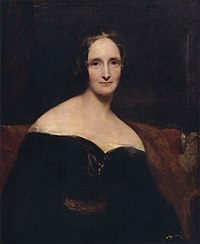The author of
Frankenstein, Mary Shelley, was born on August 30, 1797.
In addition to this Gothic novel, Shelley took a stab at the historical romance that Sir Walter Scott had developed, authoring “The Fortunes of Perkin Warbeck” in 1830.
According to Mary Shelley’s preface:
‘The story of Perkin Warbeck was first suggested to me as a subject for historical detail. On studying it, I became aware of the romance which his story contains, while, at the same time, I felt that it would be impossible for any narration, that should be confined to the incorporation of facts related by our old Chronicle to do it justice.
It is not singular that I should entertain a belief that Perkin was, in reality, the lost Duke of York. For, in spite of Hume, and the later historians who have followed in his path, no person who has at all studied the subject but arrives at the same conclusion. Records exist in the Tower, some well known, others with which those who have access to those interesting papers are alone acquainted, which put the question almost beyond a doubt…’
Ms. Shelley could not have escaped the influence of Walter Scott in her foray into the historical novel.
Deidre Lynch, who has contributed “The Cambridge Companion to Mary Shelley” writes:
‘Early in 1820 the Shelleys, then living in Italy, received a crate packed with various household articles and a selection of the new novels that had become the talk of the nation. In one, Ivanhoe, the “Dedicatory Epistle” - a letter purportedly sent by one Laurence Templeton to his antiquarian colleague, the Reverend Dr. Dryasdust - mentions a “Scottish magician, [who], you say, was . . . at liberty to walk over the recent field of battle, and to select for the subject of resuscitation by his sorceries a body whose limbs had recently quivered with existence, and whose throat had but just uttered the last note of agony.” Templeton's necromancer, who must have reminded Mary Shelley of the “unhallowed arts” of her own Victor Frankenstein, was none other than Templeton's own creator, Sir Walter Scott. In the opinion of numerous reviewers, such necromancy, resuscitating bygone figures from historical fields as varied as Norman England and eighteenth-century Scotland, had endowed the novel form itself with a new dignity. Typical is one review, which advises that Scott's Waverley should not be “consider[ed] . . . in the light of a common novel, whose fate it is to be devoured with rapidity for the day, and to be afterwards forgotten for ever”; it should rather be, this critic wrote, lauded as a “vehicle of curious accurate information upon a subject which must at all times demand our attention - the history and manners of . . . the inhabitants of these islands.” ‘
